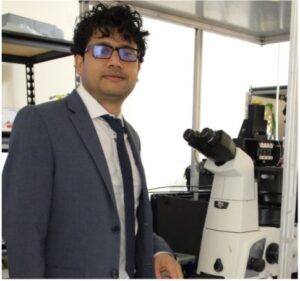Title: Understanding the Plasmon-Mediated Chemical Reactions with Surface-Enhanced Raman Spectroscopy
Abstract: Raman spectroscopy is a molecular spectroscopy that uses laser light to excite vibrations in molecules, producing characteristic peaks of different vibration modes in the Raman spectrum that can be used to identify the molecules. By adsorbing analyte molecules onto the surface of nanostructures of plasmonic metals such as gold (Au), silver (Ag), or Copper (Cu), the intrinsically weak Raman signals can be enhanced by several orders of magnitude (104 -1010) by a technique called surface-enhanced Raman spectroscopy (SERS). The incident light in the visible or NIR region can induce the surface plasmon resonance (SPR), a collective and coherent oscillation of the conduction electrons on the plasmonic metal surface, that induces high near-field enhancement. The SPR has a finite lifetime and decays by generating energetic hot electrons that can inject into the frontier electronic levels of the adsorbed molecules, inducing an array of chemical transformations also called plasmon-mediated chemical reactions (PMCRs). The PMCRs show the possibility of harvesting solar energy to drive the chemical reactions.
In this talk, I will discuss my doctoral work on the development and application of engineered plasmonic metal nanoelectrodes that can efficiently concentrate light fields and provide high SERS enhancement. Upon integrating SERS with electrochemical controls (EC-SERS), we can effectively modulate and control the course of PMCRs happening on the Au nanoelectrode surfaces. I will also discuss the facile fabrication of reliable and inexpensive Cu nanoelectrodes which are very stable and provide high SERS enhancement. The strong reduction capability of the Cu surface played an important role in controlling the course of PMCRs.
Dr. Ghimire obtained his Ph.D. in 2023 at the Department of Physics from Florida International University, Miami, Florida, supervised by Prof. Jin he, and master’s degree from Tribhuvan University, Nepal, in 2017.
His current research focuses on applying surface-enhanced Raman spectroscopy (SERS) to understand the single-particle collision dynamics, provide the mechanistic details of plasmon-mediated chemical reactions (PMCRs) on the surface of the metallic nanoelectrode nanostructures, and study and control the CO2 reduction to value-added-hydrocarbons on the copper surfaces.
